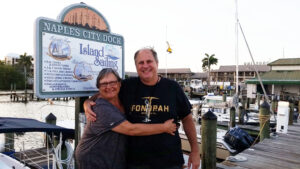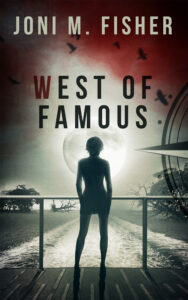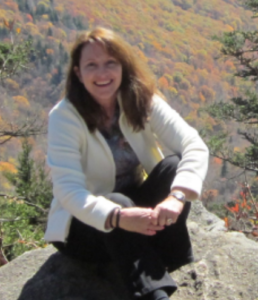In my third Christian suspense novel, West of Famous, an Oxford grad student takes a job as a celebrity body double during a school break. It’s all fun and games until she gets kidnapped.
The research for this novel included learning about trawlers, especially the kind that people live on all the time. I am an instrument-rated private pilot, so I know a thing or two about navigation, but boats? Not so much. Experts are out there, and they often love to talk about their work, their hobby, or their passion. So, I sent out a social media post asking people who lived on boats to answer the questions remaining after library and online research.
 Caryn and Paul Frink answered the call. Paul served in the Navy as a nuclear engineer. Caryn had recently retired from nursing. These intrepid empty-nesters bought a 37-foot trawler to live in, and they sold their house. They invited me to ride along during their shake-down cruise in Florida. I joyfully accepted.
Caryn and Paul Frink answered the call. Paul served in the Navy as a nuclear engineer. Caryn had recently retired from nursing. These intrepid empty-nesters bought a 37-foot trawler to live in, and they sold their house. They invited me to ride along during their shake-down cruise in Florida. I joyfully accepted.
In the story, the kidnappers plan to hide their victim on a boat. I explained the plot and pointed to a spot in the Gulf of Mexico that had no shipping lanes and little air traffic. Paul and Caryn laughed.
Paul recovered first and said, “That won’t work because you’d need a 90-foot chain for the anchor.”
This was the moment my research failed me. Paul then pulled out a map of the 10,000 islands of the Everglades and pointed to a remote spot used by bootleggers during prohibition and drug runners in the 1970s. Then he offered to go to it. On the way, I climbed into the engine hold to scream—like the kidnap victim. Caryn and Paul did not hear a thing over the sound of the engine. PERFECT!
During the week they hosted me, we examined the remote area. It was scary remote. Like-scream-and-nobody-hears-it scary. Paul explained the purpose of the various tanks (black water, gray water, potable water, seawater, and fuel) in the engine hold. I also took notes on the sensory experiences of staying on a trawler. The constant rocking, the efficiency of storage, AC and DC electricity and when to use it, common repair issues, the smells and sounds, and the top speeds of the trawler. By the end of the week, I knew by aft from my starboard and filled a notebook with nautical terms and facts. Taking hundreds of photos also helped with later descriptions of parts of the boat.
Caryn and Paul let me use their first names as characters in the book, and they gave me permission to use their boat’s name in the story. Their boat is named Seeker. How perfect is that? My book is about finding a kidnapped woman. Seeker sounds like Seek Her.
When I returned home, eager to write, the room kept swaying. I called up Caryn to ask how long it would take to get my sea legs back. She said, “Three days tops.” She was spot on.
West of Famous, published in 2018, ended up being read by Kim Russo, the Executive Director of the organization of people who live on boats. They go by the nickname Loopers because they cruise up the east coast and through lakes and waterways to the Gulf of Mexico to loop the eastern United States. This group plays an important role in the book. Their official name is America’s Great Loop Cruisers Association (AGLCA).
I was invited to their gathering in Norfolk, Virginia, to sign books on Seeker. My first book signing on a boat! I even found a wine called Seeker, which we served with cheese and crackers to people who toured the boats in the marina. They call that event Docktails.
Readers have commented that the story feels like they are experiencing it instead of reading it. That’s what deep research produces. Research is the most fun part of the writing process.
No matter how much research I do at the library or online, immersion in the topic or contact with an expert creates authenticity and accuracy. All it takes is time and the courage to ask a million stupid questions.
 A young woman plays the role of her life after kidnappers mistake her for a celebrity. Who will pay for their mistake?
A young woman plays the role of her life after kidnappers mistake her for a celebrity. Who will pay for their mistake?
Sold at all major retailers. Read the first chapter, watch the book trailer, and see the links here.
 Joni M. Fisher writes suspenseful crime stories about heroines who don’t wait to be rescued. Her Compass Crimes series has been recognized in the N.I.E.A., Clue Book Awards, Kindle Book Awards, Royal Palm Literary Awards, and others. A member of Sisters in Crime, the American Christian Fiction Writers, and the Florida Writers Association, she also served on the Arts and Humanities Advisory Board for Southeastern University.
Joni M. Fisher writes suspenseful crime stories about heroines who don’t wait to be rescued. Her Compass Crimes series has been recognized in the N.I.E.A., Clue Book Awards, Kindle Book Awards, Royal Palm Literary Awards, and others. A member of Sisters in Crime, the American Christian Fiction Writers, and the Florida Writers Association, she also served on the Arts and Humanities Advisory Board for Southeastern University.
